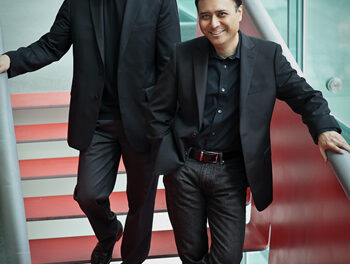The Charlotte Symphony presented Franz Joseph Haydn’s Die Schöpfung (The Creation) in Belk Theatre on March 31 and April 1. The performances involved soprano Ute Selbig, tenor Tilman Lichdi, bass Guido Jentjens, and the Oratorio Singers of Charlotte (Scott Allen Jarrett, director). CSO Music Director Christof Perick conducted. Composer, musicians, and venue came together to make the April 1 presentation pretty much a perfect concert. I feel a little like the society lady who avoids orgies “because there are so many thank-you notes to write afterwards.”
Several interesting points were made in Jarrett’s pre-concert talk: The libretto, pieced together from the King James Bible and the poetry of Milton, was probably intended originally for Handel and was around fifty years old when it came into Haydn’s hands in England. He took it to Austria, where it was done into German by Baron von Swieten, set by Haydn, and sent back to van Swieten for translation back into English to fit the notes, prior to a planned publication in both German and English. Van Swieten appears to have lost heart, and the English was never finished. The Charlotte performances were in German.
A major weak point of the evening was the failure to provide a libretto, in either German or English. English words were projected onto a screen at the top of the proscenium arch, bouncing-ball style. This wasn’t too hard to pair with the sung German, provided one had a little German, but it must have been useless to everyone else. Considering the lavish program, a cheaply-produced libretto could have been inserted.
I have always found the libretto to be dull in spite of the grandeur of its language, owing to the lack of emotional action. God creates the world in six days, giving many opportunities for interesting tone-painting on grand and delicate scales, but there is no earthly action to speak of, no birth nor death nor wedding night, no love nor jealousy, no violence nor kisses, nor death nor resurrection. So there’s a lot of bubbling of the primordial mud and twittering of birds but no abstract emotion to make music about.
Even without a love interest, this is a grand piece of music, and this was a grand performance. The Belk Theatre, with its tiers of balconies, twinkling lights, practiced ushers, and smooth but polite crowd is seemingly like a Viennese theatre. And the splendid acoustics are complete justification for creation of such an old-fashioned but totally modern space.
The house was almost completely sold out; it was on the stage that there was SRO. There were about 40 in the orchestra and 120 in the chorus. That this provided a lot of power when needed goes without saying; what can be added over and over is that the chorus was just as effective when a very small but clear sound was needed. The diction was good, the singers had been well drilled in their German, and their musicianship was superb.
Such a shopping-list libretto, rather like the list of plagues in Handel’s Israel in Egypt, lends itself to a sort of shopping-list review.
Day I: Superb choral blend, strong rhythmic drive…. The soprano solo represented the finest kind of singing – talking to a melody, perfect intonation, and no vibrato except when intentional.
Day II: Soprano very self-assured…. She put the audience at ease; there was no question that she’d miss a note, and she didn’t – but she was very exciting, too. The bass projected lovely low notes in “der helle Bach.”
Day III: The “Awake the harp and lyre” chorus was well-received by the audience and rewarded with applause. In “Lights in heaven and earth,” the tenor was lovely, superb, unforced at all times. The wind band entered with a perfect pianissimo and then built smoothly to a perfect crescendo. The string basses and cellos made perfect moonbeams.
Day IV: In addition to being a favorite, “The Heavens Are Telling” is a fine touchstone for performers and for the hall. The chorus was clear and crisp, easily capable of filling the hall in the forte passages and precise and delicate in the piano parts. The soloists were easily able to hold their own against the chorus, just as they were able to drop back to a lovely delicacy when required. Belk Theatre was a perfect space for all this. When the three soloists were indeed soloists, singing with no accompaniment and singing softly, they were still completely audible.
Day V: The creatures – especially birds twittering and trilling – begin to provide much scope for Haydn’s program music. The soprano was very clean and idiomatic, too: for example, one musical phrase was throaty, guttural, and unmistakably native German – this was no well-trained foreigner struggling with the language but the real thing!
Day IV: The rest of the beasts appear – especially cattle, creeping beasts, and – according to Van Swieten (or perhaps Herr Dr. Martin Luther) – shrimps and worms. Perick and the orchestral brought out all of the inherent humor. The walking-bass transition from “the whales” into the aria “Be fruitful and multiply; rejoice in God,” was very skillfully handled by the orchestra.
Day VII: The last day, as devised by van Swieten, is half intense praise for God and half piffle about noble Adam and his helpmate, all set to more exquisite Haydn. The libretto falls horribly short because of the absence of drama – it’s devoid of emotional lying, failed loves, and unpaid bills – and it falls short, too, because of its lack of grief, death, and violence…. It is, in fact, just everlasting praise of God – yet it’s great praise. This grand finale, and especially the final fugue, is more Handelesque than one might possibly imagine, but it’s also unmistakably Haydn. Weak libretto or no, the audience (this writer included) loved every minute of the excellent performance. Bravi!











